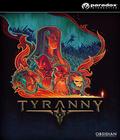Buy Tyranny
There seems to be an instinctive blueprint in developing an RPG. The setting may be different and the protagonist may vary, but you almost always follow the classic hero's journey where you rise, fall, and rise again to defeat a great evil that is plaguing the land. Tyranny is different in more than a few ways.
For many, the story immediately captures your attention. As seen in many medieval epic tales, a great clash between good and evil has commenced, but this time, evil has won, and a powerful overlord named Kyros has taken over the land of Terratus. There are pockets of resistance, but the citizens generally live under this tyrannical rule. You play the role of a Fatebinder, who's responsible for ensuring that the overlord's rules are enforced. You're tasked with delivering an edict to the armies: conquer the last remaining free land, or everyone dies.
The shift to a story where evil is triumphant isn't new. Several games, such as Dungeon Keeper and Overlord, have done it in other genres. What those games have in common is that their view of evil is exactly what you'd expect from most media. Evil is completely overt, and nothing is redeemable about the choices. Those choices are also so over the top that it's almost unbelievable even if you could buy into the mythos.
It feels different here, as the evil acts feel more realistic and sometimes necessary. Doing the right thing sometimes has bad consequences, and evil actions may make sense even if they end up oppressing people. You have to decide whether to interfere with soldiers who are harassing a merchant for his papers. Others have bigger consequences, such as deciding whether to kill a captured rebellion leader or let her go; it may scare other rebels but anger your allies. You have a number of choices and situations where you uphold the law, and that would generally feel fine if it weren't for the fact that the laws are corrupt.
To give you a better idea of how evil is so multi-faceted, look no further than the two armies you're trying to placate. On one side, you have The Disfavored, which is led by the Archon of War. This sect admires duty and honor above all else, and it takes a scorched earth approach to everything. On the other hand, you have the Scarlet Chorus, which is led by the Archon of Secrets. Unlike the Disfavored, the Chorus embraces near-anarchy, as their numbers and wild fighting style make up for their military discipline. The two armies are wildly different from one another, and you may favor one side over the other without realizing it.
Before you do any of that, you'll start Tyranny by creating your character. The creation system doesn't feel that robust when you begin. You have a decent number of premade tattoos and faces to choose from. You can craft your former life for the stats, but there isn't much of a difference between choosing a pit-fighting background over that of a diplomat. It feels pretty pedestrian, but that changes once you're given the chance to tell the story of how you ended the great war.
Told as a recap of the events using a battle map, your first experience in gameplay is relegated to choosing where you fight next and what decisions you make each time. Will you breach the wall with the help of the Disfavored, or will you take down that city with the help of the Chorus' overwhelming numbers instead? Do mages deserve to be rounded up and forced to teach your armies about their magic, or do they need to be eradicated? There are plenty of choices to make and so many routes to choose, and they all affect large parts of the main game. For example, if you negotiate a peaceful transfer of power between the rebellion and the forces of Kyros, the rebels will give you more options to avoid bloodshed. If you murder everyone in sight, no negotiation options ever show up. The different permutations will drive you nuts if you're a completionist, but you can replay these sections until you get everything just right.
When you really start the game, you'll notice how choice is the driving force in everything you do. On a macro level, your decisions cause the armies to either favor or despise you. Depending on what you do, that sentiment can move a little or a lot in either direction, and most of the time, you're informed of what'll happen in advance of your decision. Interestingly, you can get one faction to both love and hate you at the same time, so that opens up different dialogue choices and avenues for the story. There will be a split where you have to choose a side. In truth, there are actually four different major outcomes, and although it's very apparent early on what those paths are, it's still fascinating to see how it comes to pass.
On a micro level, the choices you make instill fear or loyalty in your party members. Your party members can both fear you and remain loyal to your cause. Doing so in both cases opens up lots of different combat abilities, specifically tag moves like increased taunting or launching a partner into the air so they can unleash damage from above. It makes the morality system more valuable, since you benefit from trying different things.
Though your standing in the eyes of each of the armies is important, you'll care more about your party members because there's enough material here to make them feel human. You get a sense of who they are through the dialogue in the main quests, but the optional dialogue between them and your character makes them interesting. For example, Verse is good at killing but has no qualms about dying. Barik is loyal to Kyros, and Lantry enjoys soaking up knowledge even under dire circumstances. These companions and more add plenty of meat to the story, and even though they don't grow much in the journey, they're still rather fascinating.
Elsewhere, the expected mechanics of a good RPG remain intact. There are a number of skill trees for each character, and plenty of abilities are present in each one. Everyone else in your party is split into classes, but you can strengthen them beyond the intended class. Fallen characters are automatically resurrected once a battle is over, but they're punished with wounds, which lowers their max health until they get proper rest. The magic system allows you to create and modify spells after their glyphs have been discovered. Since everyone can use these spells, it's a good excuse to explore the levels carefully and build up your stats, so you can read the glyphs in the scrolls.
If you've played Pillars of Eternity, then you have a good idea of how the combat system works here. The fights are done in a semi-real-time manner, as you can move around without waiting, but your attacks and actions have a cooldown timer. Though there is a certain challenge to performing everything live, you can pause the action to issue commands without added pressure. You can also set up AI behavior for your party, so they can either be aggressive and attack enemies or protect other party members.
Combat works well, but there are still instances where it can break. If you're fighting in constricted spaces, then be prepared to see some characters do nothing, since the pathing can break and stop them from getting into the best position for an attack. You should also expect to do more micromanaging than usual, since the AI's automatic combat options aren't always the best.
When you consider the genre, Tyranny looks quite good. The isometric viewpoint might not make the characters look very distinct — even when you zoom in the camera as far as it can go and activate big head mode — but at least the animations are nice. The same goes for the particle effects, which are good but not spectacular. What stands out are the environments, which look very rich and detailed no matter where you go. Each of the locales look different, with unforgettable traits like a statue weeping rivers of blood and majestic skylines. They're all picturesque, and for an RPG, that's where the beauty comes from.
On the audio side, the presentation really shines. The music does a great job of capturing the overall feel of the world. It creates an epic atmosphere when you're in a fight but is rather morose otherwise. The soundtrack infuses enough melancholy into proceedings that you'll feel hope is lost, fitting perfectly with the game's theme. The voice work is also rather terrific. With the exception of the Archon of Secrets, the characters all seem rather grounded in their own twisted way, and the dialogue suggests they're normal people without painting them to be stereotypically evil. Like the rest of the title, these portrayals are more chilling because they aren't fantastical.
Although it's conventional in some ways, Tyranny feels fresh. The theme has been explored before in other games and genres, but not to this degree. The characters are extremely interesting, whether they're tragic or humorous. Dialogue choices are expansive, and the sheer number of permutations that can arise from your decisions give the game near-limitless replay value. Supported by solid RPG mechanics, Tyranny is a game for those who couldn't get enough of Pillars of Eternity and its ilk.
Score: 9.0/10
More articles about Tyranny











 Tyranny is a role-playing game that introduces players to an original fantasy world where a brutal clash between good and evil has taken place – and evil emerged triumphant.
Tyranny is a role-playing game that introduces players to an original fantasy world where a brutal clash between good and evil has taken place – and evil emerged triumphant.























